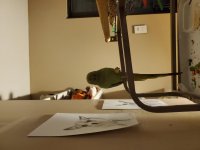WillowsMama
New member
- Mar 27, 2020
- 4
- 0
Hi there! I am brand new to this site - just joined actually!! I am looking for some tips and I guess reassurance that I'm going about things the right way with my new baby...well she's actually not a baby..she's a 4 year old ringneck..completely untame. Completely afraid of hands, has never been handled, never been hand fed, never been trained.
She is gorgeous and full of personality and I am determined to tame her and gice her a life full of love where she isnt afraid. Her last owners had her for 6 months only and didn't spend any time with her.
So when I got her and brought her home, it was abundantly clear that this was going to be challenging..
She has no problem coming out of her cage and actually spends most of the day out of her cage. She stays on top of her cage on the perch and just climbs all around her cage..occasionally diving down to the floor..shes clipped.
Anyhow, she has no issue with me coming up right beside the cage at all..I spend almost all of my free time standing with her, talking to her..after 2 weeks she took food from my fingers and is getting much lore comfortable doing it..she plays games sometimes too and takes it then drops it over and over before eating it..I know shes playing..
The problem is when I go to touch her..she will not let me. I have held her and just let her bite me and just talk softly telling her its ok and not reacting to the bites...and they hurt!! She does stop biting but shes obviously not comfortable being held. How do I get her comfortable with handling and teach her to step up??
She is gorgeous and full of personality and I am determined to tame her and gice her a life full of love where she isnt afraid. Her last owners had her for 6 months only and didn't spend any time with her.
So when I got her and brought her home, it was abundantly clear that this was going to be challenging..
She has no problem coming out of her cage and actually spends most of the day out of her cage. She stays on top of her cage on the perch and just climbs all around her cage..occasionally diving down to the floor..shes clipped.
Anyhow, she has no issue with me coming up right beside the cage at all..I spend almost all of my free time standing with her, talking to her..after 2 weeks she took food from my fingers and is getting much lore comfortable doing it..she plays games sometimes too and takes it then drops it over and over before eating it..I know shes playing..
The problem is when I go to touch her..she will not let me. I have held her and just let her bite me and just talk softly telling her its ok and not reacting to the bites...and they hurt!! She does stop biting but shes obviously not comfortable being held. How do I get her comfortable with handling and teach her to step up??
Attachments
Last edited:



